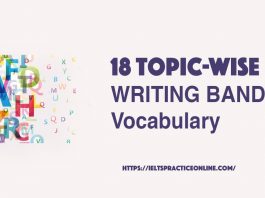Lesson 14: Space
- asteroid – one of many large rocks that circle the sun
- cosmos – the whole universe, especially when you think of it as a system
- crater – a large hole in the top of a volcano
- debris – broken or torn pieces of something larger
- exploration – the activity of searching and finding out about something
- galaxy – large isolated system of stars, such as the Milky Way
- horizon – the place in the distance where the earth and sky seem to meet
- launch – an occasion when a ship is put into water, or a spacecraft is sent into space, for the first time
- meteor – a piece of rock or other matter from space that produces a bright light as it travels through the atmosphere
- outer space – the universe beyond the earth’s atmosphere (= the air surrounding the earth).
- simulator – a piece of equipment that is designed to represent real conditions, for example in an aircraft or spacecraft
- solar system – the sun and the group of planets that move around it
- spacecraft – a vehicle used for travel in space
- space shuttle – a vehicle that takes people into space and comes back to Earth again
- cosmic – pertaining to the universe; vast
- gravitational – involving gravity
- lunar – of or relating to the moon
- meteoric – relating to or caused by a meteor
- outer – at a greater distance from the centre
- terrestrial – relating to the earth
- uninhabitable – not habitable (= suitable to live in)
- unmanned – does not have a person inside it
- acclimatize – to (cause to) change to suit different conditions of life, weather, etc.
- colonize – to send people to live in and govern another country
- propel – to cause something to move forward
- sustain – to keep something in operation; maintain
- undergo – experience or be subjected to (something, typically something unpleasant or arduous)
- acrophobia – fear of heights
- feasible – able to be made, done, or achieved
- in terms of – used to describe which particular area of a subject you are discussing
- thunderstorm – a storm with thunder and lightening
- barely – only just
- scramble – to climb up, down, or over something quickly and with difficulty
- fellow – a member of an official organization for a particular subject or job
- eventuality – a possible happening or result
- contemplate – to spend time considering a possible future action
- cathedral – a very large, usually stone, building for Christian worship
- foresee – to know about something before it happens
- shield – something or someone used as protection or providing protection
- realm – an area of interest or activity
- faith – complete trust or confidence.
- frontier – an area that is being explored
Some questions asked in previous IELTS Writing Paper that you would be able to write with the help of the vocabulary in this lesson:
- Modern trends in early education focus on an array of practical school projects rather than developing traditional skills through maths, science and similar subjects. Which do you consider the better approach and why? Explain your choice, using specific reasons and details.
